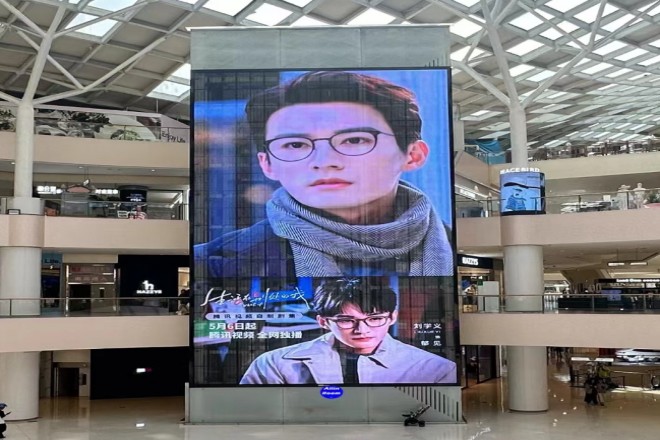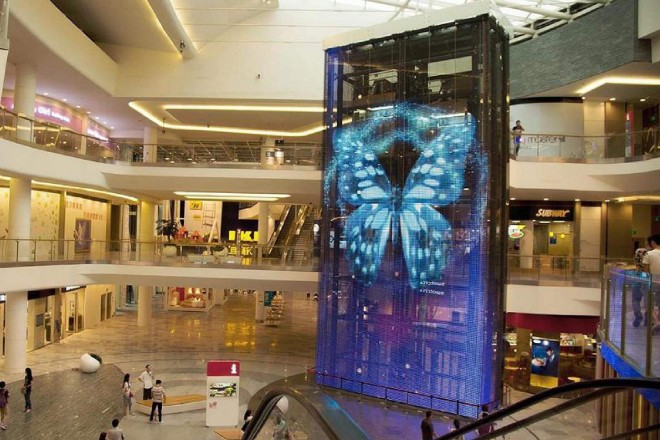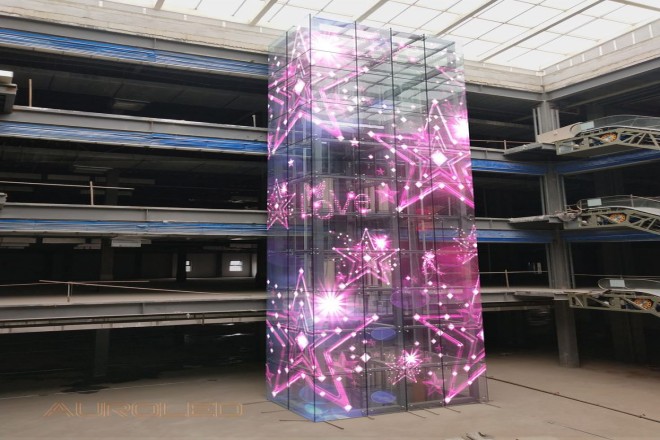Introduction

As an indispensable vertical transportation tool in today’s urban life, elevators can actually “play” with many creative designs.
The combination of sightseeing elevators and transparent LED displays is one of the many creative ideas. Do you know where the transparent LED display can be installed in the elevator? Let’s take a look.
1. Can all glass be installed with transparent LED displays?
Due to its unique charm, transparent LED displays are gradually becoming a popular choice for decoration and commercial display, especially when installed on glass surfaces, which can bring both modern and sci-fi visual effects. However, if you want this combination to look both beautiful and practical, there are still some small details to pay attention to.
1). Load-bearing and glass type
First of all, you have to know that not all glass can bear the weight of a transparent LED display. Ordinary glass may not be strong enough and prone to problems. Therefore, it is best to choose those that are specially reinforced, such as tempered glass or laminated glass. These glasses are not only stronger but also better support the display to ensure safety.
2). Transparency and visual effects
In addition, the transparency of the glass is also very important. Imagine if the glass is too blurry or has color. Can the content on the display be seen clearly? Therefore, it is best to choose glass with high transparency so that the color and brightness of the display can be perfectly displayed.
3). Installation method
The installation method is also a science. Some display screens can be directly attached to the glass, while others need to be fixed with special frames or brackets. This depends on the specific situation, such as the thickness of the glass, the size and weight of the display screen, etc. In short, make sure that the installation is firm and beautiful at the same time.
4). Treatment of special glass
If you choose a special type of glass, such as laminated glass or insulating glass, you have to pay extra attention. For example, the middle layer of laminated glass may affect the heat dissipation of the display screen, so you have to consider how to dissipate heat; insulating glass needs to pay attention to its sealing and heat insulation performance to ensure that the display screen can work normally in various environments.
Therefore, before installation, it is best to consult professionals to ensure that everything goes smoothly.
2. Feasibility analysis of installing transparent LED display screens on elevator glass

1). Technical considerations
1.1). “Match” between glass and display
Good light transmission: The elevator glass must be transparent enough to make the content of the LED display clear at a glance. Before installation, we have to measure the light transmission of the glass to ensure that the display effect is not compromised.
Stable load-bearing: The display screen plus the mounting frame is not light. Make sure that the elevator glass can bear it. If not, add a metal frame to reinforce it. After all, safety comes first.
Smooth heat dissipation: The LED display screen will generate heat when working, so don’t make it too stuffy in the elevator. You have to find a way to dissipate heat, such as adding a cooling fan, or choose a display screen with high-efficiency heat dissipation technology.
1.2). Those “small details” of installation
Firm installation: The display screen must be stable and not shaky. Find professionals and use professional tools to ensure that the installation is both firm and beautiful.
Calculate the load-bearing: Before installation, calculate the total weight of the display screen and the mounting frame to see if the elevator glass can bear it. You also have to consider earthquake resistance and anti-skid to make the display screen more stable.
Smooth ventilation: Where is the display screen installed? Of course, it is the best ventilated place in the elevator. In this way, the heat can be easily dissipated and the elevator will not be too hot.
3). Legal and safety considerations
3.1). Compliance is very important
Approval: Installing a display screen in an elevator is not a trivial matter. It must be approved by the special equipment safety supervision department. Application, evaluation, and approval, none of these processes can be missed.
Building regulations must be followed: The elevator is part of the building, and the modification or addition of equipment must comply with building safety regulations. It cannot affect the stability and safety of structures such as the elevator shaft and the machine room.
Fire safety must be noted: The display screen cannot block the evacuation passage, nor can it affect the use of fire protection facilities. Fire safety assessment and approval must be carried out in accordance with the requirements of the fire department.
3.2). Safety must be guaranteed
The elevator itself must be safe: Before installation, it is necessary to check whether the elevator complies with the current safety regulations. If it does not comply, it must be rectified first, and then the display screen must be installed.
The installation process must be safe: During the installation process, the requirements of the elevator safety regulations and the operating manual must be followed to ensure the safety and reliability of the installation process.
Post-installation inspection: After installation, strict inspection and testing must be carried out to ensure that the installation of the display screen will not have a negative impact on the safe operation of the elevator.
4). Balance between cost and benefit
4.1). Energy consumption and energy saving
The energy consumption of transparent LED display screens is a large part of the operating cost.
You must choose products with high energy efficiency ratio and good power factor, and use intelligent control systems to automatically adjust the brightness and working mode of the display screen according to the use of the elevator to reduce energy consumption.
4.2). Benefits and returns
- Advertising revenue:
Transparent LED display screens can be used as advertising carriers to earn some advertising fees. The advertising value must be evaluated based on the location, size, and audience of the display screen, and a suitable advertising sales strategy must be formulated.
- Long-term returns:
You must calculate the service life, maintenance cost, and advertising revenue of the display screen to see if it is cost-effective in the long run. You must also pay attention to market changes and competitive situations, and adjust sales strategies and operating models in a timely manner to ensure the stable development of the project.
3. Application scenarios for installing transparent LED display screens outside elevators in those scenarios
1). Floor navigation and information assistant
Floor indication is super convenient: When you walk into the building, you can see the name and location of each floor clearly marked on the transparent LED display outside the elevator. Did you find the direction instantly?
Weather forecast tips: Want to check the weather before going out? No need to take out your phone, the display outside the elevator can tell you whether it will rain today, remember to bring an umbrella!
2). The “new darling” of the advertising industry
Show windows of merchants: This screen is simply the “golden advertising space” of merchants, dynamically displaying various attractive products and discount information, making people can’t help but take a few more glances.
Precise delivery tricks: Moreover, it can also recommend advertisements based on your location, time, and preferences. Don’t you feel that it is both considerate?
3). The “face value” of the building’s appearance
The perfect combination of art and architecture: Did you know? This screen can also be matched with the appearance of the building to become a super cool work of art, which makes people can’t help but take pictures.
“Mobile gallery” for exhibitions and activities: Sometimes, it will become a “trailer” of a small exhibition or event, allowing you to feel the upcoming excitement in advance.
4. Challenges and solutions for installing transparent LED displays outside elevators

Challenge 1: Balance between transparency and brightness
Transparent LED displays need to maintain high transparency while ensuring sufficient brightness to display content, which is a major technical challenge.
1.1). Coping strategies:
- Adopt advanced materials and processes:
Select LED chips with high transmittance and high brightness, combined with precise optical design and manufacturing processes to achieve the best balance between transparency and brightness.
- Intelligent brightness adjustment:
Develop an intelligent brightness control system to automatically adjust the screen brightness according to the ambient light, which not only ensures the display effect but also avoids light pollution.
Challenge 2: Viewing angle limitation
The viewing angle of transparent LED displays may be limited, affecting the viewing effect at different angles.
2.1). Coping strategies:
- Wide-angle LED design:
Use wide-angle LED chips, combined with special optical lens design, to expand the viewing angle range and ensure consistent viewing effect at multiple angles.
- Image optimization algorithm:
Use advanced image processing algorithms to optimize the screen display content and enhance the viewing experience.
Challenge 3: Technology R&D and cost
The high R&D and production costs of transparent LED displays limit their widespread application.
3.1). Response strategies:
- Increase R&D investment:
Encourage enterprises and scientific research institutions to increase R&D investment, promote technological innovation and breakthroughs, and reduce production costs.
- Industry chain integration:
Through industry chain integration, optimize resource allocation, improve production efficiency, and reduce costs.
- Expand application areas:
Actively explore the application of transparent LED displays in other fields, such as smart homes and smart cities, and promote industrial development based on market demand.
Conclusion
In summary, installing transparent LED displays on elevator glass is not only a reflection of technological progress but also a precise grasp of the intelligent and humanized needs of future living spaces.
Although there are many challenges in practical applications, with the continuous maturity of technology and the gradual reduction of costs, this innovative technology is gradually becoming the standard in the elevator industry.
Finally, if you want to know more about LED displays, please get in touch with us.
